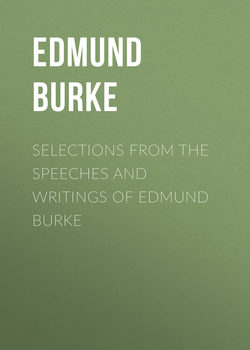Читать книгу Selections from the Speeches and Writings of Edmund Burke - Edmund Burke - Страница 3
SELECTIONS FROM THE SPEECHES AND WRITINGS OF EDMUND BURKE
NATURE AND FUNCTIONS OF THE HOUSE OF COMMONS
ОглавлениеWhatever alterations time and the necessary accommodation of business may have introduced, this character can never be sustained, unless the House of Commons shall be made to bear some stamp of the actual disposition of the people at large. It would (among public misfortunes) be an evil more natural and tolerable, that the House of Commons should be infected with every epidemical frenzy of the people, as this would indicate some consanguinity, some sympathy of nature with their constituents, than that they should in all cases be wholly untouched by the opinions and feelings of the people out of doors. By this want of sympathy they would cease to be a house of commons. For it is not the derivation of the power of that house from the people, which makes it in a distinct sense their representative. The king is the representative of the people; so are the lords, so are the judges. They all are trustees for the people, as well as the commons; because no power is given for the sole sake of the holder; and although government certainly is an institution of Divine authority, yet its forms, and the persons who administer it, all originate from the people.
A popular origin cannot therefore be the characteristical distinction of a popular representative. This belongs equally to all parts of government, and in all forms. The virtue, spirit, and essence of a house of commons consists in its being the express image of the feelings of the nation. It was not instituted to be a control UPON the people, as of late it has been taught, by a doctrine of the most pernicious tendency. It was designed as a control FOR the people. Other institutions have been formed for the purpose of checking popular excesses; and they are, I apprehend, fully adequate to their object. If not, they ought to be made so. The House of Commons, as it was never intended for the support of peace and subordination, is miserably appointed for that service; having no stronger weapon than its mace, and no better officer than its serjeant-at-arms, which it can command of its own proper authority. A vigilant and jealous eye over executory and judicial magistracy; an anxious care of public money; an openness, approaching towards facility, to public complaint; these seem to be the true characteristics of a house of commons. But an addressing house of commons, and a petitioning nation; a house of commons full of confidence, when the nation is plunged in despair; in the utmost harmony with ministers, whom the people regard with the utmost abhorrence; who vote thanks, when the public opinion calls upon them for impeachments; who are eager to grant, when the general voice demands account; who, in all disputes between the people and administration, presume against the people; who punish their disorders, but refuse even to inquire into the provocations to them; this is an unnatural, a monstrous state of things in this constitution. Such an assembly may be a great, wise, awful senate; but it is not, to any popular purpose, a house of commons. This change from an immediate state of procuration and delegation to a course of acting as from original power, is the way in which all the popular magistracies in the world have been perverted from their purposes. It is indeed their greatest and sometimes their incurable corruption. For there is a material distinction between that corruption by which particular points are carried against reason (this is a thing which cannot be prevented by human wisdom, and is of less consequence), and the corruption of the principle itself. For then the evil is not accidental, but settled. The distemper becomes the natural habit.
